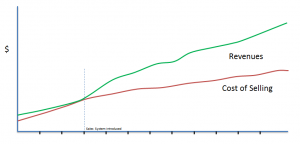The fast-paced, connected world of today makes a Sales System a success imperative. As customers gain more and more sales decision making independence, businesses need to seriously adjust their approach to cope. For the best outcomes, your system needs coherence and consistency to deal with the changing demands of the market. Only a systematic approach can produce this.
So Why a Sales System?
Your sale system is all the principles, processes and tools you set up to deliver revenue for your business. Every business, no matter how big or small has to give some consideration to this. The more attention and the more focus this component of your business receives, the better the sales function will be. Many businesses never develop this to the level of sophistication they need for it to run smoothly and productively, providing them the peace of mind they crave and the ability to fuel their business’s growth.
In a business where there is no formalised sales system, it is difficult to coordinate, harmonise and optimise the actions of the various people and processes involved in the various aspects of sales. In these situations, sales people operate in an uncoordinated fashion, sometimes independently and sometimes in isolation. This creates inconsistencies for customers, complications for management and erratic and unpredictable results. Above all, this approach does not scale. The management challenge will always be to improve the performance of the sales operation as a whole. Unless systematised, this is difficult, inefficient and time consuming.
The benefits of having a sales syst em in place are:
em in place are:
- A clearly understood (documented) process so that every person involved in it can know their responsibilities and be accountable for them
- The ability to measure the performance of each element of the process, so that low performing elements can be identified and fixed
- A scalable entity that can grow with the business
- A structure that is well suited to a team environment and able to capitalise on the diverse abilities of its members
- A manageable entity that can be effectively tuned to the environment it operates in
- Lowers the organisation’s need for highly skilled sales people
- Performance consistency over time. Team members coma and go. A system keeps running.
Let’s illustrate this by means of a case study:
Company X was selling a range of software products that addressed the needs of corporate human resources management. The products all addressed similar issues but there were different versions to suite the varying needs of different organisations. The sales cycle varied from product to product and was considerably longer and more complex for the more costly versions. These were subject to more stringent requirements and more detailed examination by prospective customers.
The business was owned by a software engineer who understood each product intimately. In order to achieve their sales objectives, a team of 4 was required. They all reported to the owner. The business had a basic web site and promoted their products principally at industry conferences. Website traffic was quite good but it was poor at generating leads.
Each sales person was responsible for their own prospecting which comprised following up leads collected at conferences and also cold calling companies off a list that had been compiled for this purpose.
Their sales process was basic: Find a lead – someone who expressed interest in a product. Prepare a proposal and submit to the prospect. Arrange a demonstration and keep following up until a sale was made or the sales person gave up in frustration.
The average cost of each customer acquisition was 9.4% of revenue.
The problems:
- No standard proposal documents. Apart from pricing, each sales person tried their hand at writing a convincing piece about the product and the benefits to the customer

- Sales people were expected to do prospecting by phone – which they all detested. As a result, there were too few prospects in the pipeline
- Each salesperson followed up their own leads – irrespective of the product or customer
- Salespeople crossed paths in the market often
- Ineffective follow up saw many sales fall through, especially when they were busy
- The overall conversion rate was too low
- Other than revenue and conversion rate by sales person, no additional statistics were measured
The analysis
- Too few sales opportunities being generated => too few opportunities at any given moment
- Inadequate qualification => Opportunity quality too low, conversion rate too low
- Inconsistent and erratic sales process => difficult to improve efficacy
- Inefficient use of resources. 20% of sales people’s time spent selling, 80% spent prospecting. Should be the reverse
- Too expensive. Acquisition cost should be much lower
The System solution
- Focus on improving efficiency by standardising the process and all collateral, reduce time spent in non customer-facing activity
- Employ dedicated telephone prospecting specialists; cheaper than sales people and more productive. Liberate 80% of sales people’s time
- Introduce clear qualification criteria for prospects so that time is not wasted on poor quality opportunities
- Organise the sales team by product/market and avoid crossover.
- Redesign the website for better conversion and pace the manual sales process in line with customer’s time line.
- Introduce multiple measuring points throughout the sales process to make it easy to identify inefficiencies and make it more manageable.
These steps made getting a better result much easier and far less costly. Over a 12 month period, the following results were recorded:
- Conversion rate improved by 36%
- Acquisition cost was reduced by 23%
- Sales revenues improved by 32%
- Month by month revenues were stabilised
A major benefit of introducing a proper sales system was the reduction in stress of all people engaged in sales. The morale improved and the business owner was considerably relieved.
If you are involved in the running of a sales operation, is this something you have given enough attention to?


